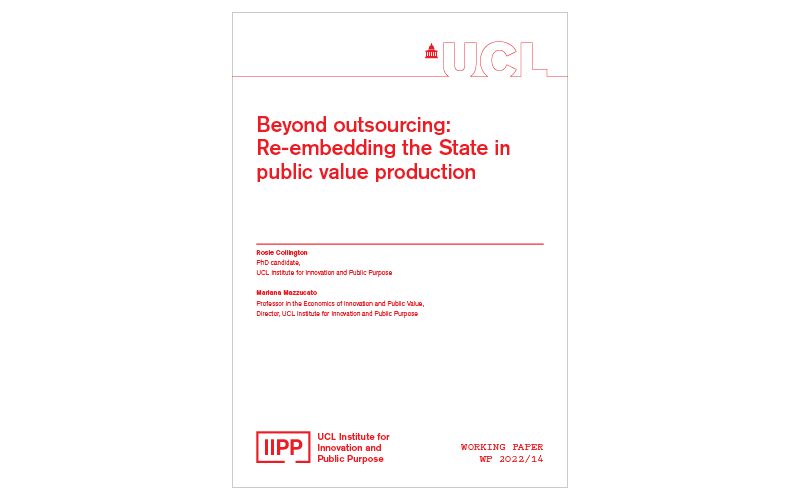Beyond outsourcing: Re-embedding the State in public value production
This paper makes the case for re-embedding the state in public value production and for public sectors to move beyond outsourcing the delivery of core services and functions.

22 August 2022
UCL Institute for Innovation and Public Purpose (IIPP) Working Paper Series: IIPP WP 2022/14
Authors:
- Mariana Mazzucato | Director and Professor in the Economics of Innovation and Public Value, UCL Institute or Innovation and Public Purpose
- Rosie Collington | PhD Candidate, UCL Institute for Innovation and Public Purpose
Reference:
Collington, R. and Mazzucato, M. (2022). Beyond outsourcing: Re-embedding the State in public value production. UCL Institute for Innovation and Public Purpose, Working Paper Series (IIPP WP 2022-14). Available at: https://www.ucl.ac.uk/bartlett/public-purpose/wp2022-14
Abstract:
Public Value Theory (PVT) emerged within a broader public administration paradigm that called for the recentering of the state in the identification and management of public activities in response to the attempts of neoliberal politicians to marginalize it. PVT’s advocates remained nonetheless ambivalent about the role of the state in the production of goods and services necessary to create public value. In the decades since, public sector outsourcing has grown in scale and scope, particularly in Anglo-Saxon economies. PVT is unable to account for the implications of this mode of public value production, and why it may undermine the state’s ability to create public value over time. In this article, we argue that the disembedding of the state from the production of public value undermines its capacity for learning and adapting organizations, which are critical if the state is to respond to changing needs and demands. Because what constitutes public value evolves, so too must the resources and capabilities for producing public value be reconfigured. In other words, public value creation is contingent on innovating the means of public value production. We make the case for reembedding the state in public value production and for public sectors to move beyond outsourcing the delivery of core services and functions.
 Close
Close

